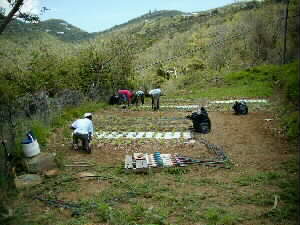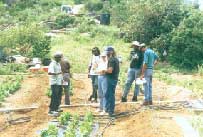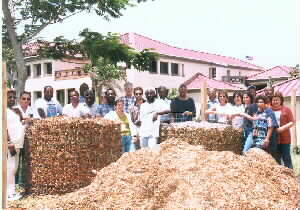

Community Engagement
- UVI In the Community
- Research & Public Service (RPS)
- Alliance for Responsive Investment in Children’s Health: Virgin Islands (A RICH VI)
- Agricultural Experiment Station (AES)
- Center for the Study of Spirituality & Professionalism (CSAP)
- Community Engagement and Lifelong Learning (CELL) Center
- Caribbean Exploratory Research Center (CERC)
- Cooperative Extension Service (CES)
- Current Events: Community Presentations, Summer Camps, Pesticide Safety Programs
- Classes, Workshops & Camps
- Fairs & Annual Events
- Fundraisers
- USVI S.A.R.E. Program
- Agriculture & Natural Resources
- Demonstration Garden
- 4-H, Family & Consumer Sciences
- Communications, Technology & Distance Education
- Staff
- Join Our CES Contact Lists
- CES Document Library
- Ag Discovery
- Cybersecurity Program & Activities
- Emerging Caribbean Scientists (ECS) Programs
- Etelman Observatory
- Institute for Leadership & Organizational Effectiveness (ILOE)
- Office of Self Determination and Constitutional Development
- Reichhold Center for the Arts
- Safety in Paradise (SIP)
- Small Business Development Center (SBDC)
- St. John Academic Center
- Summer Programs
- The Caribbean Writer
- VI-EPSCoR
- VI Writing Project
- Virgin Islands Environmental Resource Station (VIERS)
- Virgin Islands Marine Advisory Service (VIMAS)
- Virgin Islands University Center for Excellence in Developmental Disabilities (VIUCEDD)
- WUVI Student Radio Station
- Community Service Photos
- Caribbean Film & Artistic Cinematic Festival (CF&AVF)
Sustainable Agriculture
The  viability of Virgin Islands agriculture is increasingly becoming dependent upon the ability of local producers to maintain competitiveness in a changing Caribbean and world market. Producers will need assistance in evaluating alternative enterprises, opportunities, and agricultural practices which will sustain our agricultural resources to ensure continued production and optimum crop yields.
viability of Virgin Islands agriculture is increasingly becoming dependent upon the ability of local producers to maintain competitiveness in a changing Caribbean and world market. Producers will need assistance in evaluating alternative enterprises, opportunities, and agricultural practices which will sustain our agricultural resources to ensure continued production and optimum crop yields.
OBJECTIVE
- Increase the knowledge of the staff of CES and other local and federal agriculture -support government agencies of the concept and production practices of sustainable agriculture.
- Increase knowledge of farmers and other interested residents on the importance of sustainable agricultural practices.
- Increase the number of farmers selecting the alternative crops and/or adopting sustainable agricultural practices on their farm sites.
Most limited resource farmers in the Virgin Islands have been using various forms of sustainable agricultural practices in their production system for many years. Several constraints were identified as factors that affected the implementation of new or improved sustainable agriculture practices. Some farmers do not keep adequate records, therefore, complete data are not available on the increase or decrease of yields. Without proper records, farmers cannot quality for federal assistance programs.
OBJECTIVES
- Develop awareness among Cooperative Extension Service, Agricultural Experiment Station, and USDA-Farm Service Agency administrators of sustainable agriculture concepts, so that they can give public support to sustainable agriculture in the V.I.
- Promote collaborative research and extension outreach programs for alternative agriculture enterprises and sustainable production practices that are appropriate to the needs and interest of local producers.
- Expand the training of appropriate Cooperative Extension Service, Agricultural Experiment Station, and USDA-Farm Service Agency staff to include the importance of conserving our limited natural resources.
Information on Sustainable Crop Management practices in the Virgin Islands is limited, on-farm research is important.
- Base line data are generated for future research.

- The development of production standards.
- Farmers are an integral part of research project; from planning to data analysis and information dissemination.
At a recent farmers field day, research specialist Mr. Stafford Crossman points out the response of basil grown under various mulch types and utilizing drip irrigation.
Close examination of the impacts of trash handling on the territory's water, land, and communities have led to much concern in the VI . The local government has to find answers to the solid waste problems of these communities. One of the most effective alternatives for reducing solid waste is composting. Composting is a means of not only reducing the waste entering our landfills, but also recycling waste materials into a valuable commodity that can be used in gardening, landscaping, and for other agricultural uses. Composting will greatly improve the quality of life for residents and provide a cost saving to the people of the Virgin Islands. The Backyard Composting project targets the community's neighborhood groups, civic organizations, home-owner associations, school teachers, school aged youth, and youth groups to increase their knowledge and awareness of the importance of composting. The goal is to increase the number of residents involved in backyard composting, resulting in a substantial reduction of the amount of yard waste entering the Virgin Islands Landfills.
A large percentage of the garbage going into the landfill of the territory consists of yard waste (i.e. leaves, stems, branches).

Various government agencies and non profit organizations took part in a three day composting workshop. The participants will be involved in training others in the methodology of composting.